 |
Paul Leventhal founded the Nuclear Control Institute in 1981 and served as its President for 22 years prior to becoming Founding President in June 2002. Before establishing NCI, Mr. Leventhal held senior staff positions in the United States Senate on nuclear power and proliferation issues. He now runs NCI as a Web-based program and maintains a word-searchable electronic archive at www.nci.org and a collection of NCI and Senate papers spanning more than 30 years at the National Security Archive. He has prepared five books for the Institute---Nuclear Terrorism: Defining the Threat (Pergamon-Brassey’s, 1986), Preventing Nuclear Terrorism (Lexington, 1987), The Tritium Factor (with the American Academy of Arts and Sciences, 1989) Averting a Latin American Nuclear Arms Race (Macmillan, 1992), and Nuclear Power and the Spread of Nuclear Weapons (Brassey’s, 2002). He has lectured in a number of countries on nuclear issues, including as Distinguished Visiting Fellow at Cambridge University's Global Security Programme, 1991. Mr. Leventhal organized the Institute's International Task Force on Prevention of Nuclear Terrorism (1986-87), its conference in South America on averting a nuclear arms race between Argentina and Brazil (1989), a coalition of eminent U.S. scientists and diplomats seeking a halt in further production of nuclear-weapon materials (1989), and a working group of public interest organizations in Washington on nuclear proliferation issues (1981-86). He served as Special Counsel to the Senate Government Operations Committee, chaired by Senator Abraham Ribicoff (D-CT), l972-76, and as Staff Director of the Senate Nuclear Regulation Subcommittee, chaired by Senator Gary Hart (D-CO), l979-1981. He was responsible for the investigations and legislation that resulted in enactment of two landmark nuclear laws---the Energy Reorganization Act of 1974, fissioning the Atomic Energy Commission into separate regulatory and promotional nuclear agencies, and the Nuclear Non-Proliferation Act of 1978, establishing stricter controls on U.S. nuclear trade to combat the spread of nuclear weapons. The non-proliferation act’s requirement that countries accept international inspections on all their nuclear activities (“full-scope safeguards”) as a condition of receiving U.S. nuclear assistance eventually was adopted as an international norm by the Nuclear Suppliers Group. He also served as co-director of the bipartisan Senate Special Investigation of the Three Mile Island Nuclear Accident, co-chaired by Senators Hart and Alan Simpson (R-WY), 1979-1980, and prepared the "lessons-learned" legislation enacted in 1980 to require preventive measures and emergency planning for future accidents. Mr. Leventhal came to Washington in 1969 as Press Secretary to Senator Jacob K. Javits (R-NY) after a decade of political and investigative reporting for the Cleveland Plain Dealer, New York Post and Newsday. In 1970, he took a leave from Javits’ staff to serve as campaign press secretary to Senator Charles Goodell (R-NY). In l972, he served as Congressional Correspondent for National Journal before returning to Capitol Hill to pursue legislative and investigative responsibilities. Mr. Leventhal was a Research Fellow at Harvard University's Program for Science and International Affairs and a Visiting Fellow at the Brookings Institution, 1976-1977, concentrating on nuclear weapons proliferation under a grant from the Ford Foundation. He served as Assistant Administrator for Policy and Planning at the U.S. National Oceanic and Atmospheric Administration (NOAA), 1977-1978.
He holds a bachelor's degree in government, magna cum laude, from
Franklin and Marshall College. The college presented him its Alumni
Medal in 1988 for distinguished professional accomplishment and
contributions to society, and an honorary doctor of laws degree in 2001
prior to his delivering that year’s
commencement address. He holds a master's degree from the Columbia
University Graduate School of Journalism. He is married and has two
sons. Sharon Tanzer is the Institute's vice president and a member of the Board of Directors. She was co-editor of Averting a Nuclear Arms Race in Latin America (Macmillan, 1991), the proceedings of the Institute's 1989 Montevideo conference. She was rapporteur and editor of the Tritium Factor, (Nuclear Control Institute/American Academy of Arts and Sciences, 1989), the proceedings of a 1988 nuclear arms control workshop co-sponsored by NCI and the Academy. She was also project coordinator for the Institute's International Task Force on Prevention of Nuclear Terrorism. She has organized and participated in the Institute's meetings and briefings on nuclear proliferation and nuclear terrorism issues in Europe, India, Japan, and Latin America. Ms. Tanzer received her Bachelor of Arts degree in history, cum laude, from Barnard College in 1962. She spent the following year as a Fulbright Fellow at the University of Bordeaux, France, and then earned a master's degree in European history from Stanford University in 1964. Her responsibilities include the Institute's initiatives in Germany and on
EURATOM and matters relating to the transport of nuclear materials and nuclear waste. Alan Kuperman is a senior policy analyst for the Institute, where his work focuses on the U.S. program to phase out global commerce in bomb-grade, highly enriched uranium. He previously served as the Institute's issues director, and, in 1987, co-authored an NCI report that disclosed plans to proceed with air shipments of plutonium to Japan in the absence of a crashproof shipment cask, leading to cancellation of those plans. Kuperman is also an Assistant Professor at the LBJ School of Public Affairs, University of Texas at Austin. He is author of one book, The Limits of Humanitarian Intervention: Genocide in Rwanda (Brookings, 2001), as well as chapters in several other books, including American Foreign Policy: Theoretical Essays (Longman, 2005), Clashing Views on Controversial Issues in American Foreign Policy (McGraw-Hill/Dushkin, 2005), American Foreign Policy: Cases and Choices (Foreign Affairs Books, 2003), and Nuclear Power & the Spread of Nuclear Weapons (Brassey’s, 2002). His articles have appeared in journals and newspapers including Foreign Affairs, Political Science Quarterly, Security Studies, The New York Times, The Washington Post, and The Wall Street Journal. He holds a Ph.D. in Political Science from MIT, an M.A. from the Johns Hopkins University School of Advanced International Studies (SAIS), and an A.B. from Harvard University. He has received fellowships from Harvard University, MIT, the University of Southern California, the U.S. Institute of Peace, the Brookings Institution, and the Institute for the Study of World Politics.
Previously, he was chief of staff to Rep. James
Scheuer, legislative assistant to Speaker of the House Tom Foley, and
legislative director for Rep. Charles Schumer when the congressman
authored a U.S. law restricting exports of bomb-grade uranium.
Eldon V.C. Greenberg advises the Institute on legal matters relating to U.S. nuclear non-proliferation law. He is a partner in the law firm of Garvey Schubert & Barer. He has served as general counsel for the National Oceanic and Atmospheric Administration, deputy general counsel for the Agency for International Development, and staff attorney for the Center for Law and Social Policy. Mr. Greenberg's legal analysis of the U.S. nuclear cooperation agreement with Japan provided the basis for challenges of the agreement by both foreign affairs committees in Congress and by the Institute and resulted in "clarifications" of the agreement by the Administration with respect to U.S. rights and obligations under the Treaty. Mr. Greenberg also advises the Institute on nuclear export law and regulations. He has intervened successfully on behalf of the Institute in a number of proceedings before the U.S. Nuclear Regulatory Commission. The analyses by Mr. Greenberg of the Nuclear Non-Proliferation Treaty and the
U.S.-EURATOM agreement have laid the groundwork for the Institute's initiatives on these
matters. He will continue to play a key role in these and other legal aspects of the
Institute's program. |
 |
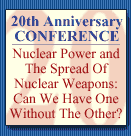 |
 |
 |
 |
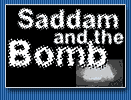 |
 |
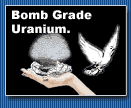 |
 |
 |
 |
 |
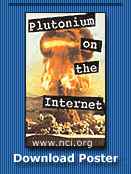 |
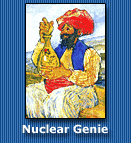 |
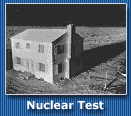 |